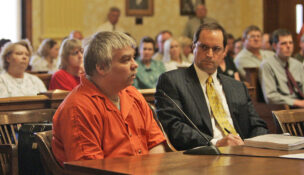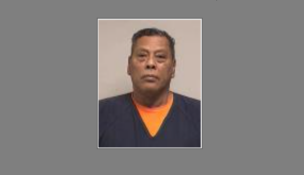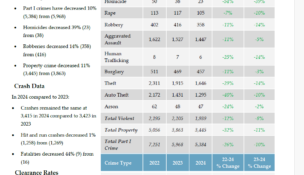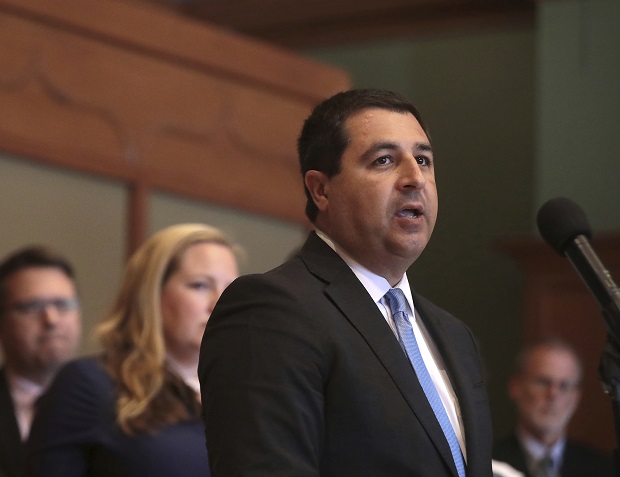Van Hollen unhappy with budget language (UPDATE)
By: Associated Press//June 24, 2013//

By
TODD RICHMOND
Associated Press
MADISON, Wis. (AP) – Wisconsin Attorney General J.B. Van Hollen said Monday he can’t support provisions his fellow Republicans added to the state budget that would delay transmitting arrestees’ DNA to the state crime labs and allow bounty hunters to operate in the state.
Van Hollen told The Associated Press in an interview that the DNA changes would delay investigations and there’s no reason to change the state’s current bond system. The attorney general wouldn’t say if he has asked Gov. Scott Walker to use his partial veto powers to specifically eliminate the new language before signing the budget, but did say his office has been communicating with Walker’s as recently as Monday morning.
“I expect that, as he has throughout the budget, he’s going to do what he thinks he can that’s in the best interest of public safety, including vetoes if necessary,” Van Hollen said. “I would like to see some tweaks to different things that we recommended to him.”
Republicans who control the state Senate and Assembly passed the $70 billion two-year budget last week. Walker is expected to sign it into law by July 1, the start of the state’s new fiscal year. The Republican governor has broad veto powers that enable him to reshape the spending package to his liking. So far, though, his office has revealed little about what changes he might make.
“Governor Walker is evaluating the budget, and any veto or non-veto decisions will be released when the process is completed,” Walker spokesman Tom Evenson said in response to Van Hollen’s remarks.
Walker’s proposed budget included a plan he and Van Hollen designed that would require police to seize DNA from anyone arrested for a felony or certain sex-related misdemeanors. It’s a major departure from current state law, which allows DNA seizure only upon convictions of a felony or sex-related misdemeanor. The plan’s supporters argue more DNA profiles in the state’s database will help police solve crimes; privacy advocates have blasted it.
Republicans on the Legislature’s Joint Finance Committee, the panel that revises the budget before sending it to the full Assembly and Senate, made a number of changes to the proposal. In May, they removed the provision requiring DNA samples to be provided at arrest for misdemeanors. During an all-night session this month, they added a provision that would prohibit police from sending arrestees’ DNA samples to the crime labs until a court finds officers had probable cause to make the arrest.
Van Hollen told The AP he doesn’t have an issue with not seizing DNA in misdemeanor arrests, saying that’s just a small portion of the plan. But delaying samples’ arrival at the crime labs weakens the proposal, he said.
“Obviously the longer things are delayed getting into the system, the fewer cases we can potentially resolve,” Van Hollen said. “If we thought these alternatives that were proposed would have worked better they would have been in our proposal … When they start changing the nature of programs like this at midnight sessions of Joint Finance, they’re not always well thought out and because of that I think you run into administrative issues that aren’t real palatable.”
During the same all-night session, the committee added language that would allow judges in Dane, Kenosha, Milwaukee, Racine and Waukesha counties to let defendants hire bail bond agencies. The agencies would charge defendants 10 percent of the bond, pay the counties 3 percent of the bond and could send bounty hunters after any defendant who doesn’t show up for court. The program would expand statewide after five years.
Opponents contend bail bondsmen would target the poor, convince judges to set high bail amounts and run roughshod over neighborhoods searching for defendants. Walker vetoed a similar plan in the 2011 budget.
Van Hollen said no one has explained to him why legislators should change state’s current bond system.
“It changes the cash flow in the system. It changes how law enforcement and courts do business now and I think it’s very risky,” Van Hollen said.
A spokeswoman for Senate Majority Leader Scott Fitzgerald, R-Juneau, declined to comment. A spokeswoman for Assembly Speaker Robin Vos, R-Juneau, didn’t immediately return a message.
Van Hollen also said he doesn’t support a Republican bill that would prohibit Wisconsin police from enforcing any new federal firearm restrictions.
Rep. Michael Schraaa, an Oshkosh Republican, is preparing a bill that would block state and local law enforcement officers from enforcing any federal action that bans or restricts semi-automatic weapons, assault weapons or magazines; or requires people to register their guns or turn them over to the government.
Van Hollen said he supports gun rights but doesn’t believe Schraa’s bill is wise, because he thinks cooperation between state and federal law enforcement officers would suffer.
Schraa didn’t immediately return a message.
Legal News
- Steven Avery prosecutor Ken Kratz admits ‘mistakes were made’
- Colombian national extradited to Milwaukee faces International narcotics-trafficking conspiracy charge
- MPD: Milwaukee homicides down nearly 40 percent compared to last year
- EVERS: Republican lawmakers No-Show at special meeting to release statewide PFAS funding, stabilize healthcare access
- Wisconsin ICAC Task Force conference on Missing and Exploited Children highlights increase in sextortion cases
- More than 300 Wisconsin officers back in law enforcement after being fired or forced out
- Former Trump staffer who said to ‘fan the flame’ after 2020 loss hired to lead Wisconsin GOP
- Gov. Evers appoints David Casey to Serve as DOR Secretary
- Former Marine sentenced for Molotov Cocktail attack against Planned Parenthood Clinic
- ABA names 34th Annual Margaret Brent Women Lawyers of Achievement Awards honorees
- FBI launches criminal investigation into Key Bridge collapse
- Man charged in slaying after woman’s leg found at Milwaukee-area park
WLJ People
- Power 30 Personal Injury Attorneys – Russell Nicolet
- Power 30 Personal Injury Attorneys – Benjamin Nicolet
- Power 30 Personal Injury Attorneys – Dustin T. Woehl
- Power 30 Personal Injury Attorneys – Katherine Metzger
- Power 30 Personal Injury Attorneys – Joseph Ryan
- Power 30 Personal Injury Attorneys – James M. Ryan
- Power 30 Personal Injury Attorneys – Dana Wachs
- Power 30 Personal Injury Attorneys – Mark L. Thomsen
- Power 30 Personal Injury Attorneys – Matthew Lein
- Power 30 Personal Injury Attorneys – Jeffrey A. Pitman
- Power 30 Personal Injury Attorneys – William Pemberton
- Power 30 Personal Injury Attorneys – Howard S. Sicula











